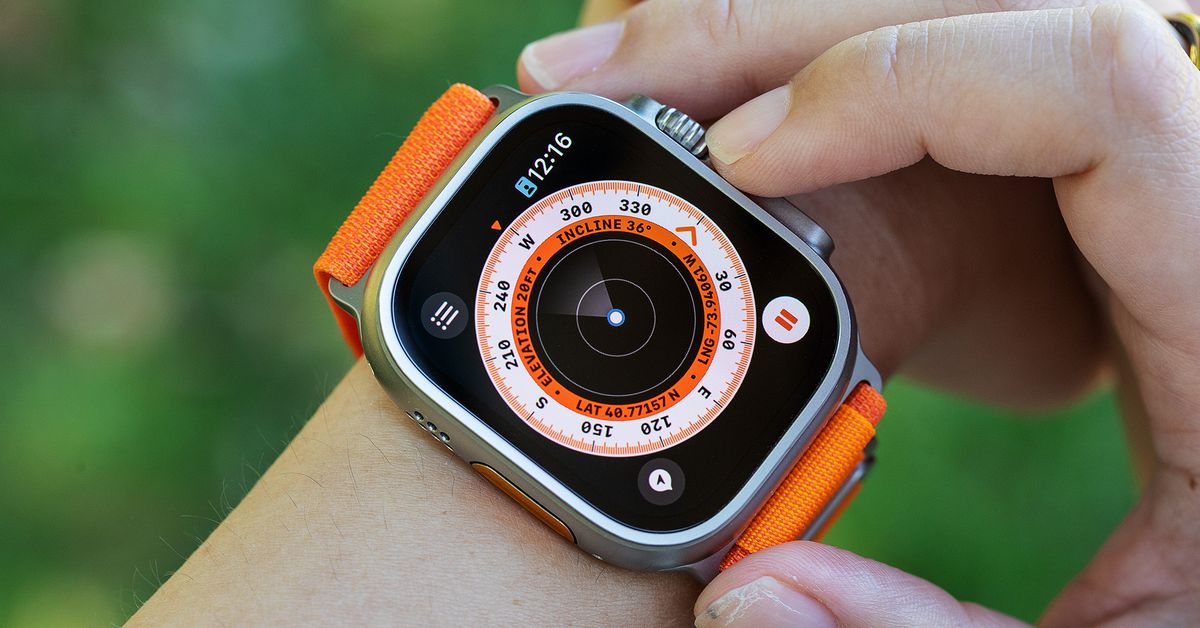Why Masimo thought it could take on Apple

For over three years now, Apple has been entrenched in a messy legal battle over a single feature on the Apple Watch — and Apple’s opponent, medical device maker Masimo, seems confident it can win. And there’s a good reason Masimo might believe that: the company came out on top when it sued True Wearables, a startup run by a former executive with a stint on the Apple Watch team, on similar grounds.
In 2018, Masimo filed a complaint against True Wearables over claims its wireless pulse oximeter infringed on Masimo’s patent. The court sided with Masimo and issued a permanent injunction against the sale of the device in December 2022.
Sound familiar? Well, the pulse oximeter tech isn’t the only parallel between Masimo’s cases against True Wearables and Apple: before starting True Wearables, founder and CEO Marcelo Lamego worked at both Masimo and Apple, where he helped develop similar technologies. Lamego plays a key role in Masimo’s lawsuit, as the company alleges Apple couldn’t have developed some of the technology for the Apple Watch without him — although Apple sees things a bit differently.
While at Masimo and its sister company, Ceracor, Lamego had “unfettered access” to “highly confidential technical information,” while also receiving training from its “most skilled engineers and scientists,” according to Masimo’s 2020 lawsuit against Apple. He also worked closely with the team that developed non-invasive sensors and monitors for vitals like blood oxygen levels. Then, after over 10 years of working for Masimo, Lamego expressed interest in working at Apple.
Lamego wrote an email to Apple CEO Tim Cook in 2013, offering to help Apple develop a “new wave of technology” that would make it “the number one brand in the medical, fitness and wellness device” industry.
“I have developed several medical devices in the last 10 years,” Lamego wrote. “I am positively sure I could add a significant value to the Apple team, if I was given the chance of becoming part of it in a senior technical executive position and without conflicting with the large IP I have developed for Masimo and Ceracor during the same period.” An Apple recruiter followed up hours later, court documents show.
Lamego joined Apple in 2014 and is named as an inventor of several of the company’s health-related patents that were “closely tied” to his work at Masimo, according to Masimo’s lawsuit against True Wearables. While on the Apple Watch team, he also played a role in hiring engineers, reviewing hardware and algorithm architectures, and advising teams on bio-sensing capabilities, as listed on his LinkedIn profile.
However, as pointed out by Bloomberg, Lamego left Apple mere months after joining because he “clashed with managers, demanded multimillion-dollar budgets and wanted the ability to hire his own engineers without approval.” That’s when Lamego went on to start his own company, True Wearables, which Masimo claimed used its technology when developing the Oxxiom, a wireless and disposable pulse oximeter.
Lamego’s quick departure from Apple meant he wasn’t around when Apple released the Watch Series 6 — the first one with the blood oxygen sensor Masimo claims Apple copied. Still, Masimo is pushing for ownership of the health-related patents Lamego developed for Apple. Masimo claims Lamego developed the patents’ subject matter while he was employed by Ceracor and because of this, Lamego “had an obligation to assign said subject matter, patents, and patent applications to their employer, Masimo and Cercacor.”
One year after its win against True Wearables, Masimo CEO Joe Kiani is turning up the heat on Apple
Apple views Lamego’s time at the company differently: it alleges that neither Lamego nor the other Masimo employees it hired were involved in the creation of the products and features Masimo is suing over. In its argument against having Cook and Apple COO Jeff Williams deposed, Apple says Lamego’s email to Cook came “years before development began on the accused products,” implying that the two events were unrelated.
Apple released its first Watch, which only came with a heart rate sensor, the year after Lamego left, and it didn’t add a blood oxygen sensor until 2020. That doesn’t change the fact that Apple also hired other former Masimo employees, Masimo argues. One of those employees is former Masimo executive Michael O’Reilly, who started at Apple in 2013 and currently works on the company’s Health Special Projects team, according to his LinkedIn profile. Masimo claims O’Reilly was “privy to extremely sensitive information,” such as information about mobile medical products, wellness applications, and clinical data gathering.
One year after its win against True Wearables, Masimo CEO Joe Kiani is turning up the heat on Apple. “This is not an accidental infringement — this is a deliberate taking of our intellectual property,” Kiani said in an interview with Bloomberg. “These guys have been caught with their hands in the cookie jar.”
Earlier this year, the International Trade Commission (ITC) ruled that Apple’s wearables infringed on Masimo’s patents and later handed down a US import ban on the Watch Series 9 and Watch Ultra 2. The ban went into effect on December 26th, 2023, but Apple swiftly filed an appeal and won a court order to temporarily pause the ban. While Apple can resume selling both devices, it will need to wait until US Customs and Border Protection determines the changes Apple made to the watches are significant enough to avoid a patent dispute. That decision is set for January 12th.
https://www.theverge.com/2023/12/28/24016913/apple-patent-dispute-masimo-lagemo-true-wearables